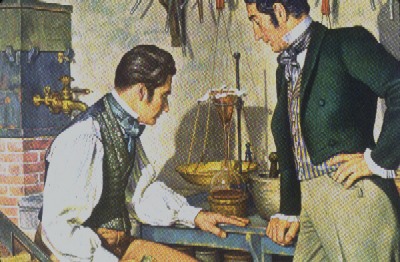 Pelletier
chose a career in chemistry where he particularly focused his attentions on
the analysis of medicinal plants.
Pelletier
chose a career in chemistry where he particularly focused his attentions on
the analysis of medicinal plants.P. J. Pelletier
Pierre Joseph Pelletier was born in Paris in March 1788. His father, Bertrand Pelletier, was a pharmacist. So from an early age Pelletier was surrounded by science and therefore became interested in it.
 Pelletier
chose a career in chemistry where he particularly focused his attentions on
the analysis of medicinal plants.
Pelletier
chose a career in chemistry where he particularly focused his attentions on
the analysis of medicinal plants.
A key discovery was made in 1817 by a German chemist Serturner. He found that the crystalline substance obtained from opium, which was named Morphium, was a base. This was the first example of an alkaloid.
Back in Paris at the same time Pelletier was analysis compounds from plants. In 1820 Pelletier, along with another French chemist J. B. Caventou isolated quinine from the bark of a cinchona tree for the first time. Pelletier had initially kept his discovery of quinine quiet, but once he had published his secret extracted quinine quickly established itself in medicinal practice. So much so, that in 1826, 90,000 ounces were produced to meet the great demand.
In 1827 Pelletier was awarded the Monyton prize, of 10,000 francs, by the Paris Academy of Science. This was his reward for his great discovery.
Pelletier worked as a chemist
throughout his life and contributed to a number of other discoveries before
his death in 1846.